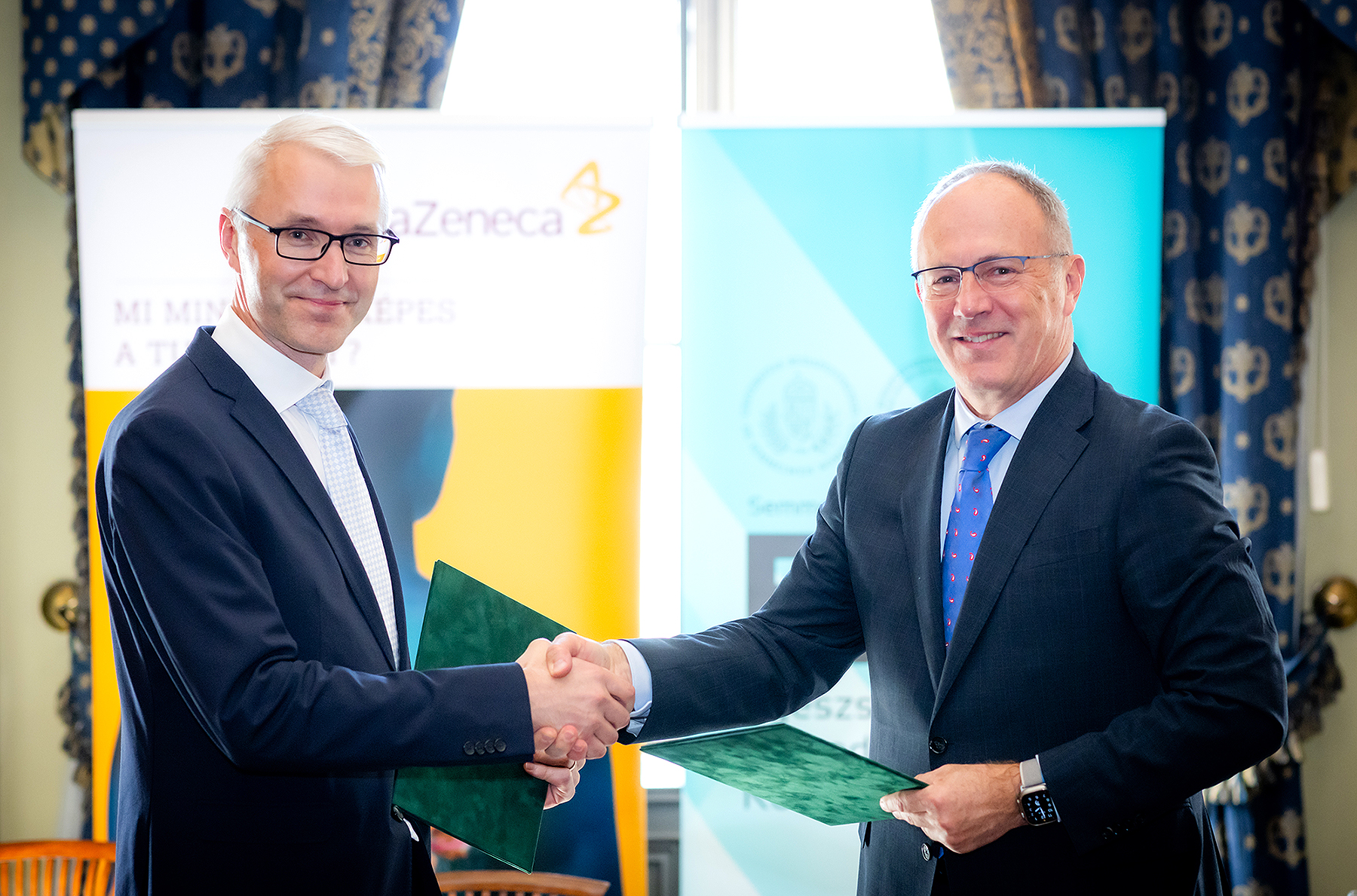AstraZeneca, Semmelweis Uni Announce Strategic Collaboration

AstraZeneca’s Kuuno Vaher, on the left, and Miklós Szócska, dean of the Faculty of Public Health at Semmelweis University.
AI and data science have revolutionized many areas of healthcare in recent years. Still, real breakthroughs can be hindered because developments are often made in isolation. A new strategic collaboration between AstraZeneca and Semmelweis University’s Faculty of Public Health hopes to overcome that.
The cooperation focuses on preventive medicine, processing a wide range of patient data to improve patient pathway management, prevent and treat public health and other diseases effectively, and expand the national and international medical knowledge base.
“A multifaceted analysis of larger samples, based on or comparable with international experience, could open up new perspectives for developing data-driven health policy in the country,” says Deputy State Secretary for Professional Management of Health Judit Bidló.
“The analysis of available data on chronic obstructive pulmonary disease and COVID-19 complications will contribute significantly to the effective management of these diseases,” she notes.
Semmelweis University’s Faculty of Public Health and AstraZeneca announced the signing of the strategic framework agreement to decision-makers and medical partners at a professional event in November.
“Semmelweis University’s Faculty of Public Health is a professional workshop for the domestic data-driven healthcare paradigm shift,” says Miklós Szócska, dean of the Faculty of Public Health at Semmelweis University. “The primary goal of the expert team is to enhance the systemic capability of data-driven healthcare and artificial intelligence technologies in our country,” he explains.
“This can enable Hungary to develop data-driven solutions at the national strategic level, in public benefit partnerships with strategic partners willing to invest in developing this knowledge base, to implement an internationally applicable model,” Szócska says.
Strong Support
“We are working to develop this system capability as part of the National Laboratory’s data-driven health division, which is now receiving additional resources thanks to AstraZeneca’s domestic and international background and extensive research experience. Strong decision-maker support will help us to put the results into practice as soon as possible for more effective patient care,” he adds.
The collaborating partners have already begun the first joint research projects focusing on the early diagnosis of patients with chronic obstructive pulmonary disease (COPD) and severe asthma, identifying factors and patterns of deterioration and appropriate therapeutic interventions. In Hungary alone, COPD affects around half a million people. The symptoms can easily be mistaken for asthma, and it is usually diagnosed when the damage is irreversible.
Another new area of research is screening immunocompromised patients with increased exposure to the COVID-19 virus and its complications and grouping them based on risk factors and the degree of vulnerability.
“AstraZeneca has a very broad portfolio and global presence, allowing it to share its experience and database in oncology, cardiovascular, renal and metabolic diseases, rare diseases, respiratory and immunology,” explains Kuuno Vaher, director of AstraZeneca’s Central European Cluster.
“Our core mission is to develop innovative new medicines that make a real difference to patients’ lives. Today’s clinical practice requires extensive collaborations, including not only scientific research but also medical and social education, to implement complex treatment regimens and introduce new therapies,” he says.
“Hungary has a strong basis for data science projects, with a professional scientific base, a high level of digital literacy and innovative thinking. We believe that by working together, we can move closer to a more successful treatment of many common diseases of civilization,” Vaher adds.
This article was first published in the Budapest Business Journal print issue of November 17, 2023.
SUPPORT THE BUDAPEST BUSINESS JOURNAL
Producing journalism that is worthy of the name is a costly business. For 27 years, the publishers, editors and reporters of the Budapest Business Journal have striven to bring you business news that works, information that you can trust, that is factual, accurate and presented without fear or favor.
Newspaper organizations across the globe have struggled to find a business model that allows them to continue to excel, without compromising their ability to perform. Most recently, some have experimented with the idea of involving their most important stakeholders, their readers.
We would like to offer that same opportunity to our readers. We would like to invite you to help us deliver the quality business journalism you require. Hit our Support the BBJ button and you can choose the how much and how often you send us your contributions.










